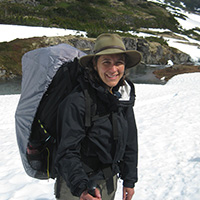Project Abstract
Changing climate conditions have increased the occurrence of mass-movement hazards in the cryosphere, such as landslides, debris flows, and slope failures resulting from thawing of ice-rich permafrost. Mass-movement hazards across the cryosphere pose a significant risk to people and infrastructure, such as highways and pipelines. This project brings together experts from diverse backgrounds, including engineers, geoscientists, computer scientists, and officials from a variety of academic institutions, public and government agencies, and industry, to discuss key challenges and formulate research priorities in 1) characterizing mass-movement hazards in the cryosphere, 2) mapping such hazards using machine learning, 3) forecasting such hazards using artificial intelligence, and 4) building climate-change-resilient infrastructure through flexible and adaptive approaches to reduce costs. The project outcomes enable planners and policy makers to identify critical infrastructure that is most threatened by mass-movement hazards in the Arctic, sub-Arctic, and mountainous regions, and high- and low-hazard areas when planning future infrastructure near urban and rural sites.
This award funds the development and planning activities of a convergent research team to address infrastructure resilience and adaptation to increasing mass-movement risks across the cryosphere as the climate warms. Planning activities center around two annual workshops that will identify gaps in our current understanding and existing methodologies to develop: 1) more automated hazard mapping tools through remote sensing and machine learning, including well-established tools like convolutional neural networks; 2) compilations of datasets and databases and interactions with potential users; 3) more reliable artificial intelligence models including time series machine learning for hazard forecasting; and 4) more flexible and adaptive approaches to reduce costs for infrastructure resiliency and adaptation.
Logistics Summary
This collaboration between Qiu (2022444, PSU) and Darrow (2022438, UAF) aims to establish a research team to address infrastructure resilience and adaptation to increasing mass-movement (landslides) risks in regions at risk from climate change. The Pennsylvania State University (PSU) and the University of Alaska Fairbanks (UAF) will each host a 2-day workshop in 2021. The participants’ primary purpose is to speak, engage in discussions, help synthesize the latest research developments, and identify gaps and challenges in mapping and forecasting mass-movement hazards. The workshop at PSU would focus on applying AI to forecast mass movement hazards, and the second at UAF would focusing on mass movement and infrastructure resilience and adaptation. Workshops only, no fieldwork will be conducted.
Project Location
Dates
-Location
Fairbanks, AK; State College, PAMembers
Principal Investigator

Principal Investigator

Co-Principal Investigator

Co-Principal Investigator

